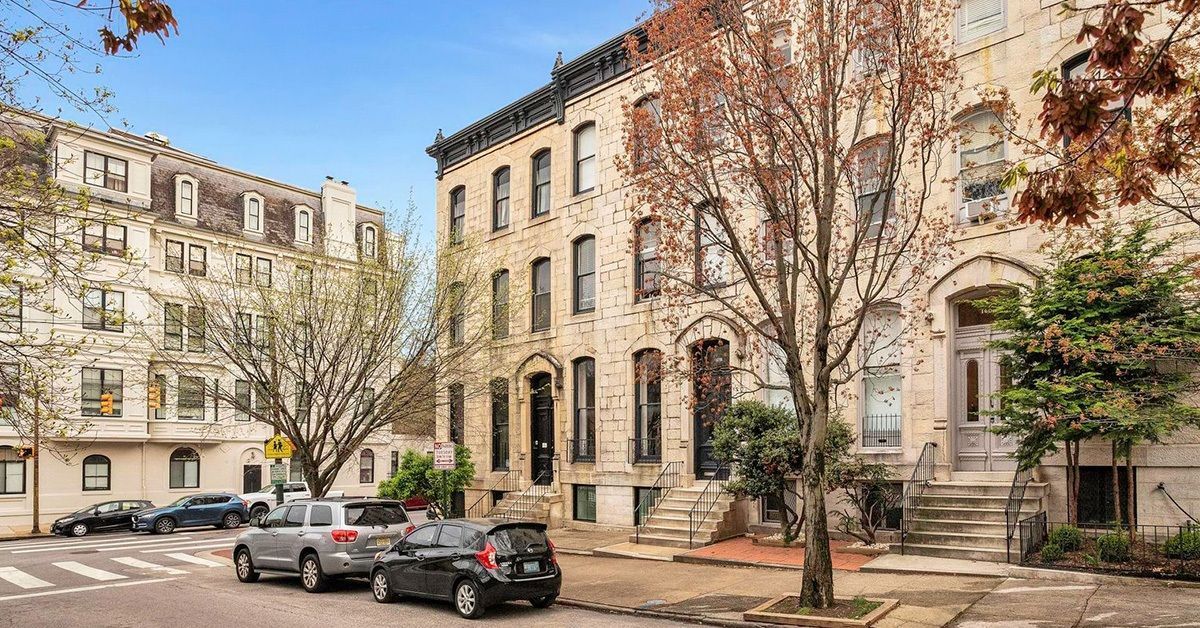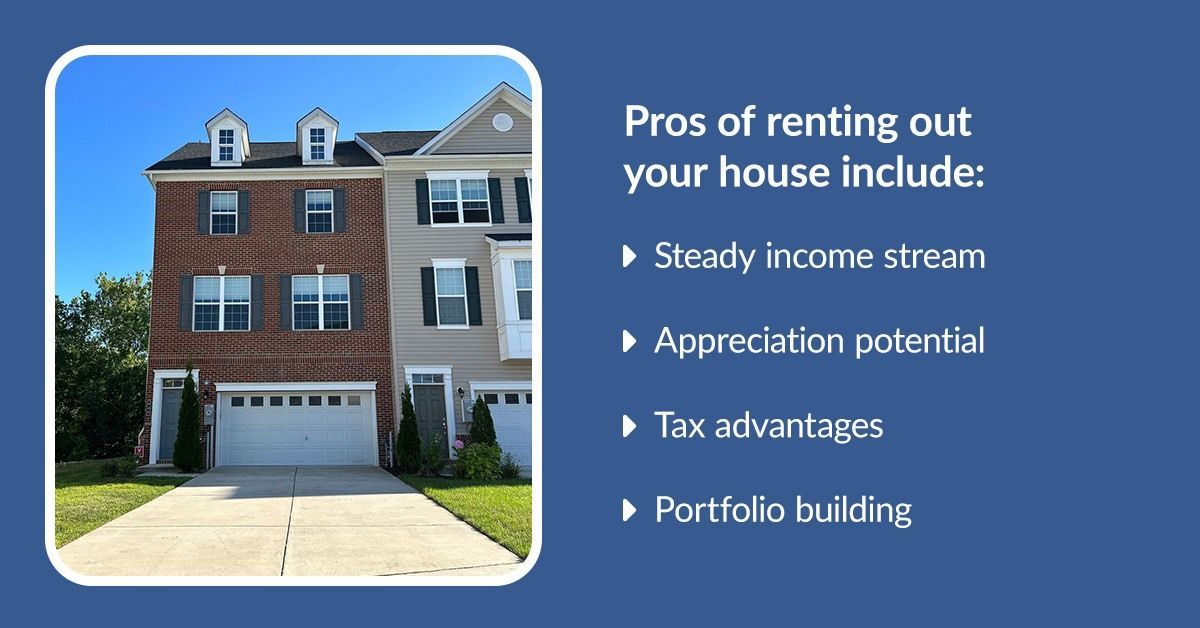A Stress-Free Guide to Renting Out Your House

Deciding if you can rent out your house can be a profitable move or a management headache. The choice often comes down to cash flow, long-term appreciation and personal bandwidth for property management.
With the right strategy, renting out your home can become a steady source of income without losing sleep over legal details, tenant issues or maintenance calls. Whether you're a first-time landlord testing the waters or a homeowner relocating but holding onto real estate, this guide will break down the essentials you need for a smooth, stress-free rental experience.
Should You Rent Out Your House?
Homeowners often consider renting their houses out when they relocate for work, inherit a property or can't sell quickly in a shifting market. In these cases, rental income may help offset mortgage payments while the property builds equity. If the rental market in your area is strong, your asset could generate positive cash flow each month, turning idle real estate into a revenue stream. Renting lets you hold the property while values appreciate, and tax deductions on mortgage interest, repairs, and depreciation can strengthen your balance sheet.
Pros of renting out your house include:
- Steady income stream: Rental payments have the potential to cover the mortgage, fees for Homeowners and Community Association (HOA) insurance, and potentially leave you with a profit.
- Appreciation potential: While tenants cover expenses, the property may gain long-term value.
- Tax advantages: Owners can often deduct maintenance costs, property taxes and depreciation.
- Portfolio building: Converting your house into a rental creates a stepping stone toward broader real estate investment.
You should also be aware of the cons of renting out your house. Vacancies, late payments and property damage can cut into your return on investment (ROI), so tenant screening is critical. Leaky roofs and broken HVAC units don't wait — as a landlord, you need reserves and reliable vendors. A rental property also doesn't offer quick capital and isn't as easy to cash out as other investments.

Step-by-Step Process for Renting Out Your House
If the pros outweigh the cons for you, it's time to learn how to rent out your house. Before getting started, remember that you may need certain permissions to rent out your house. Some mortgage lenders have specific requirements for turning a house into a rental property. You should also check with your local HOA, if applicable.
Then, follow these steps:
1. Assess Financial Feasibility
Start with a cash flow analysis. Compare projected rental income against your mortgage, insurance, property taxes, HOA fees and expected maintenance costs. Also factor in vacancy rates and property management fees for outsourcing. The goal is to land on a positive monthly balance that signals viability.
2. Understand Local Laws and Compliance
Every state and municipality has landlord-tenant laws that govern leases, security deposits, habitability standards, and eviction procedures. Review zoning requirements and short-term rental restrictions. Failing to comply can lead to fines or legal disputes.
Landlords in Pennsylvania must comply with state and local regulations, which include:
- Security deposits: Landlords can charge up to two months' rent as a security deposit in the first year. These deposits must be kept in a separate escrow account, and the interest earned after two years is returned to the tenant annually.
- Notice periods: Landlords must provide 15 days' notice to terminate a lease of less than one year and 30 days' notice for leases of over a year. Termination for nonpayment only requires a 10-day notice.
- Local ordinances: Philadelphia and Pittsburgh, for example, require rental licenses and inspections before occupancy.
3. Prepare the Property
You take pride in your property and want to show that to the people renting your house. A rental-ready home must be safe, clean and code-compliant. This often means servicing HVAC systems, testing smoke detectors, fixing leaks and refreshing paint or flooring. Energy-efficient appliances and modern finishes may also justify higher rent. Presentation and strategy will determine whether your property attracts reliable tenants or sits vacant.
Success hinges on creating a rental that stands out in a competitive market. Avoid the common mistakes first-time landlords make by:
- Boosting curb appeal: A clean exterior, trimmed landscaping and a fresh coat of paint on the front door signal quality to prospective renters.
- Prioritizing functionality: Ensure all locks, outlets and appliances work properly. Functional basics build trust with tenants.
- Upgrading strategically: Focus on high-impact upgrades like modern lighting or energy-efficient windows. These features increase perceived value without breaking the budget.
- Staging for showings: Neutral decor, uncluttered spaces and good lighting let tenants envision the property as their own.
- Planning for durability: Install materials that withstand heavy use, such as vinyl plank flooring. Long-term maintenance costs are lower when finishes are tenant-proof.
- Documenting everything: Keep detailed maintenance records and receipts — organized documentation helps future disputes and supports your tax deductions.
4. Determine Rent Price
When determining how much you can rent your house out for, start by conducting a market rent survey and comparing similar properties in your neighborhood. Online rental platforms, MLS data and property management companies provide benchmarks — because if you price too high, you risk vacancies. Too low, and you leave money on the table.
In Pennsylvania's diverse markets, the following helps you set a competitive rate for your rental property:
- Consider seasonality: Rental demand peaks in late spring and summer, so price aggressively in the off-season to reduce vacancies.
- Factor amenities: Off-street parking, upgraded kitchens or proximity to transit hubs may justify higher rents.
- Account for expenses: Ensure your rate covers your mortgage, taxes, insurance and a reserve for maintenance. Aim for a margin above break-even.
5. Market the Property
High-quality photos, accurate descriptions and clear terms encourage tenants to rent your house. Highlight features that will drive demand, like parking, in-unit laundry or proximity to schools. Use listing services, social media and real estate networks to reach prospective tenants. To rent quickly, your property needs visibility. Capture renters' interest with virtual tours and targeted advertising that lets you attract remote renters or busy professionals looking in specific neighborhoods.
6. Create a Thorough Lease Agreement
A strong lease sets clear expectations and protects both you and your tenants. At a minimum, include:
- Names of all tenants
- How long the lease is valid for
- Rent payment details
- Security deposit terms
- Maintenance expectations for both the landlord and tenant
- Rules and restrictions for occupancy
- Entry and notice requirements
- Default and termination clauses
7. Screen Tenants Thoroughly
Run background, credit and rental history checks, in addition to verifying incomes, to ensure your tenants' monthly rent is no more than 30% of their income. Use clear criteria and consistent screening practices to reduce the risk of default and protect yourself against fair housing violations. You must also check their rental history, contacting past landlords to confirm payment reliability and property care.
Ready to Rent Out Your House? Get a Free Quote from American Heritage Property Management
Renting out your house makes sense if your market has a consistent rental demand, you're prepared for ongoing maintenance, and you partner with a trusted property management company. Managing a rental is like running a small business, and the workload can quickly become overwhelming. A professional property manager handles marketing, leading rent collection, inspections, and legal compliance on your behalf.
At AHPM, we know how to rent out a house. Our team offers property management services throughout Central Pennsylvania and Maryland. Since 1981, we have had thousands of rental units in our care, with low vacancy rates and around-the-clock emergency repair services. As a full-service property management company, we take care of every part of the process and protect your real estate investments.
Contact us today for stress-free rental property management.





